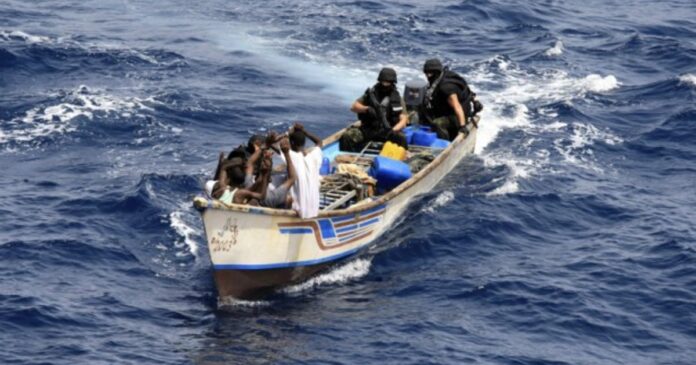By Jeph Ajobaju, Chief Copy Editor
Cargo vessels are coming under increasing attacks at Apapa and Tin Can Island Ports in Lagos, launched by heavily armed pirates who rampage in speed boats to cart off both imports and exports and wreck businesses at Nigeria’s busiest seaports.
The latest report by Vanguard Maritime Report corroborates an earlier one that more than 95 per cent of global sea piracy in 2020 occurred on the Gulf of Guinea, as found by Allianz Global Corporate & Specialty SE’s (AGCS).
A source close to a container terminal told Vanguard that the attackers come mostly at night and barge crews simply allow them to steal whatever quantity of cargo they want.
The attacks usually occur between 1am and 3am when security is at its lowest.
Terminal operators have written to the Nigerian Ports Authority (NPA), Nigerian Maritime Administration and Safety Agency (NIMASA), and the Navy and have been assured that something would soon be done to beef up security.
Modus operandi
The source recounted that “the sea robbers are attacking containers on the barge. When they are bringing export cargo to the terminal or they are taking import cargo from the terminal.
“The sea robbers broach the containers before coming down here or while they are at our shore here.
“They attack mostly between 1 and 3 am at night; we have written letters to NIMASA, the Nigerian Navy, and the NPA management to please do something about the security of the waters because the attacks are on the increase actually.
“It is not only our terminal, [they attack] other terminals as well.
“[The authorities] said they are coming up with measures to confront this menace on our waters, so we experience this from the waterside.”
Nura Wagani, a member of Barge Operators Association of Nigeria (BOAN) and Managing Director of Nurwags Integrated Services Managing Director, confirmed to Vanguard that the thieves attack barges conveying goods to and from the ports.
He said although it has not happened to his own barges, some members of BOAN have complained of their barges being attacked.
An attack normally occurs where there is no security, he added, but “sometimes it happens when barges are plying in waters; it is happening in many locations.
“It happened at Ikorodu terminal, it has happened at Kirikiri terminal, in some places where there is no security; hoodlums attack export goods, it is theft.
“The last time it would have happened to my barge, but I thank God I had some people onboard. As they came my people raised the alarm and the hoodlums escaped.
“It is not like they come with arms, if you say attack it means that they came with arms and move away goods. These burglars, even inside the port they do burgle containers.
“We have complained, we have even taken the matter to the police, but I cannot say what the outcome is because I am not with them now.
“It is not all barge operators that are members of BOAN; if it happens to members, they do complain. There are individual operators that are not our members.”
Gulf of Guinea is global piracy hotbed
AGCS said in its recent Safety & Shipping Review 2021 that more than 95 per cent of global sea piracy in 2020 occurred on the Gulf of Guinea.
The report of the insurance giant shows that the span of the Atlantic Ocean from Sao Tome and Principe in West Africa to Brazil and the Guianas in the South America had the highest crew numbers kidnapped last year.
That brackets Nigeria among countries with the highest incidents of sea piracy.
The review, reported by The Nation, confirmed that 49 large ships got lost worldwide last year with total losses down 50 per cent over 10 years while the number of shipping incidents stood at 2,703, declining year-on-year.
The industry was resilient through the pandemic, but crew change crisis has long term consequences, according to Allianz Global.
It noted that COVID-19 delays and a surge in demand for shipping increased the cost of insurance claims and inadequate ship maintenance could bring future claims.
“Suez Canal incident shows ever-increasing vessel sizes continue to pose a disproportionately large risk with costly groundings and salvage operations. High number of fires and containers lost at sea.
“The world’s piracy hotspot, the Gulf of Guinea, accounted for over 95 per cent of crew numbers kidnapped worldwide in 2020,” the review said.
“The international shipping industry continued its long-term positive safety trend over the past year but has to master COVID-19 challenges, apply the learnings from the Ever-Given Suez Canal incident and prepare for cyber and climate change challenges ahead.
“The shipping sector total losses are at historic low levels for the third year running. However, it is not all smooth sailing.
“The ongoing crew crisis, the increasing number of issues posed by larger vessels, growing concerns around supply chain delays and disruptions, as well as complying with environmental targets, bring significant risk management challenges for ship owners and their crews.
Global ship loss hot spot
“The South China, Indochina, Indonesia and Philippines maritime region remains the global loss hot spot, accounting for one in every three losses in 2020 (16) with incidents up year-on-year.
“Cargo ships (18) account for more than a third of vessels lost in the past year and 40 per cent of total losses over the past decade. Foundered (sunk/submerged) was the main cause of total losses over the past year, accounting for one in two vessels.
“Machinery damage/failure was the top cause of shipping incidents globally, accounting for 40 per cent.”
The report said the blocking of the Suez Canal by the Ever-Given container ship in March 2021 was the latest in a growing list of incidents involving large vessels or mega ships.












